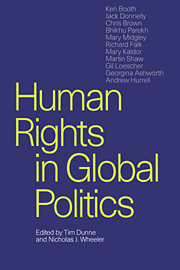Book contents
- Frontmatter
- Contents
- List of contributors
- Preface and acknowledgements
- Introduction: human rights and the fifty years' crisis
- I Theories of human rights
- II The practices of human wrongs
- 6 The challenge of genocide and genocidal politics in an era of globalisation
- 7 Transnational civil society
- 8 Global voices: civil society and the media in global crises
- 9 Refugees: a global human rights and security crisis
- 10 The silencing of women
- 11 Power, principles and prudence: protecting human rights in a deeply divided world
- 12 Learning beyond frontiers
- Index
8 - Global voices: civil society and the media in global crises
Published online by Cambridge University Press: 05 June 2012
- Frontmatter
- Contents
- List of contributors
- Preface and acknowledgements
- Introduction: human rights and the fifty years' crisis
- I Theories of human rights
- II The practices of human wrongs
- 6 The challenge of genocide and genocidal politics in an era of globalisation
- 7 Transnational civil society
- 8 Global voices: civil society and the media in global crises
- 9 Refugees: a global human rights and security crisis
- 10 The silencing of women
- 11 Power, principles and prudence: protecting human rights in a deeply divided world
- 12 Learning beyond frontiers
- Index
Summary
This chapter examines the conditions under which the voices of the most oppressed, struggling and victimised sections of human society are able to be heard in world politics. It does this first by elaborating a theoretical account of the development of ‘global society’, the globalisation of state power leading to what I call the ‘global state’, the novel processes involved in the constitution of contemporary ‘global political crises’ and the nature and role of ‘global civil society’. Secondly, it looks more closely at the problem of ‘global representation’ in relation to Western civil society and state, and argues that we need to test the idea of global civil society by examining these problems within global crises.
The chapter then introduces a more specific discussion of different civil society institutions, based on my study of civil society in responses to the Iraqi wars of 1991 (I use this general term to indicate the importance of the Iraqi revolts compared to the Gulf War which has held the overwhelming attention of Western academics). First, it examines the limitations of national civil societies and traditional representative institutions in the West, highlighting especially the routinised nature of debates about war within them. Secondly, it discusses the inadequacies of some new representative institutions of global civil society, such as transnational social movements, in representing those struggling in zones of crisis, arguing that their ideological agendas too are often geared to the pro- and anti-nation-state approach. Other new, globalist institutions, such as humanitarian agencies and campaigns (which are forms distinct from social movements), have been more effective.
- Type
- Chapter
- Information
- Human Rights in Global Politics , pp. 214 - 232Publisher: Cambridge University PressPrint publication year: 1999
- 5
- Cited by



